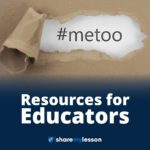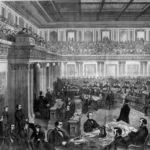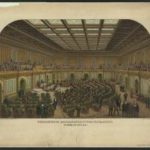How do educators invest in productive, deep, and transformative dialogue in their classrooms? Civic Conversations is a collaboration between the Edward M. Kennedy Institute’s civic education programming and the community-building dialogic structure practiced by Essential Partners. Explore resources, activities, and lesson structures that support educators as they facilitate difficult conversations, create inclusive learning environments, raise complex discussions, and promote a safe space for students to consider their values and engage in their communities. Policy simulations at the Kennedy Institute reflect the wide range of issues that face our country today. Students debate the best way to reform our immigration system, consider the balance between privacy and security, and think about how to meet the challenge of climate change. As in the real Senate, it’s natural that students will disagree on the best approach to many civic issues. This collection of resources will support educators as they prepare to discuss civic issues, either in preparation for a Kennedy Institute field trip or to practice listening, sharing, and learning in the classroom.
The Bill of Rights in Modern Times
In this lesson, students will learn about the individual rights that are included in the Bill of Rights and current issues relating to them. Students will use C-SPAN Classroom’s Constitution Clips to explore what each of these rights mean and determine how these rights apply to current events in America. This lesson works well with classes with one-to-one devices or in flipped classrooms.
Media Literacy: Making Sense of the 24/7 News Cycle
A free press is essential to the success of a democracy. As the media has evolved over time to include radio, television, internet and now smart phones and social media apps, the ability in “being capable to read them” needs examining. This lesson guides students through analysis of social media posts, the definition of terms relevant to the media, and provides tools for identifying quality sources for examination of current political issues. This lesson accompanies the Talking Turkey: Taking the ‘Dis’ Out of Civil Discourse program as well as YLI and American Evolution’s First Freedom Wall. Free registration is required to access the lesson plan.
The Me Too Movement: Resources for PreK-12 Teachers and School Staff

The #MeToo and #MeTooK12 movement is an opportunity for schools to reflect on how to address issues of consent, sex education, relationships and undoing a pervasive culture of silence. April is also Sexual Assault Awareness month. The Share My Lesson team curated a collection of free resources to help educators with critical conversations and lesson planning, as well as school procedures and policies and opportunities for reflection.
Civil Rights: Identifying Community Issues
The Constitution: That Delicate Balance

Constitutional issues come to life in this Emmy Award-winning series. Key political, legal, and media professionals engage in spontaneous and heated debates on controversial issues such as campaign spending, the right to die, school prayer, and immigration reform. This series will deepen understanding of the life and power of this enduring document and its impact on history and current affairs, while bringing biases and misconceptions to light.
The Campus Speaker: A Case Study in Free Speech
Use this classroom-ready lesson to examine free-expression issues surrounding a controversial speaker invited to appear at UC Berkeley. We provide questions to help guide your students on if and when offensive speech should be banned, and what are the competing groups and interests.
Constitutional Crisis and Impeachment: Lesson Plans and Activities

Historically, the United States House has only impeached two presidents, Andrew Johnson and Bill Clinton. However, neither president ended up being removed from office by the Senate. Share My Lesson has curated this collection of free lesson plans and resources to support educators in teaching students about what impeachment means, the history of impeachment, and how the impeachment process works.
The U.S. Constitution: Continuity and Change in the Governing of the United States

This unit examines continuity and change in the governing of the United States. Lessons one and two are focused on a study of the Constitution and Bill of Rights and provide access to primary source documents from the Library of Congress. Lesson three investigates important issues which confronted the first Congress and has students examine current congressional debate over similar issues. Lesson four features broadsides from the Continental Congress.
The U.S. Census
This Current Events and the Constitution focuses on the U.S. Census. With the 2010 census now underway, some have concerns that the questions are too personal or that the federal government should not have access to this information. Do the questions on the 2010 census form exceed Congress’s constitutional mandate to count population every ten years “in such a manner as they shall by law direct”?
